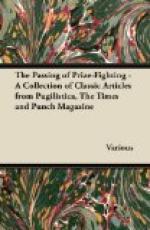Such may be the hopes of a few, innocent of the knowledge of the stony-heartedness of Toryism. For ourselves, we hope nothing from Sir ROBERT PEEL. His flourish on the warming and ventilation of the new Houses of Parliament, taken in connexion with his opinions on the Corn Laws, reminds us of the benevolence of certain people in the East, who, careless and ignorant of the claims of their fellow-men, yet take every pains to erect comfortable hospitals and temples for dogs and vermin. Old travellers speak of these places, and of men being hired that the sacred fleas might feed upon their blood. Now, when we consider the history of legislation—when we look upon many of the statutes emanating from Parliament—how often might we call the House of Commons the House of Fleas? To be sure, there is yet this great difference: the poor who give their blood there, unlike the wretches of the East, give it for nothing!
Sir ROBERT’S speech promises nothing whatever as to his future policy. He leaves everything open. He will not say that he will not go in precisely the line chalked out by the Whigs. “Next session,” says. Sir ROBERT, “you shall see what you shall see.” About next February, Orson, in the words of the oracle in the melo-drama, will be “endowed with reason.” Until then, we must accept a note-of-hand for Sir ROBERT, that he may pay the expenses of the government.
“I have already expressed my opinion, that it is absolutely necessary to adopt some measures for equalising the revenue and expenditure, and we will avail ourselves of the earliest opportunity, after mature consideration of the circumstances of the country, to submit to a committee of the whole house measures for remedying the existing state of things. Whether that can be best done by diminishing the expenditure of the country, or by increasing the revenue, or by a combination of those two means—the reduction of the expenditure and the increase of the revenue—I must postpone for future consideration.”
Why, Sir ROBERT was called in because he knew the disease of the patient. He had his remedy about him. The pills and the draught were in his pocket—yes, in his patriotic poke; but he refused to take the lid from the box—resolutely determined that the cork should not be drawn from the all-healing phial—until he was regularly called in; and, as the gypsies say, his hand crossed with a bit of money. Well, he now swears with such vigour to the excellence of his physic—he so talks for hours and hours upon the virtues of his drugs, that at length a special messenger is sent to him, and directions given that the Miraculous Doctor should be received at the state entrance of the patient’s castle, with every mark of consideration. The Doctor is ensured his fee, and he sets to work. Thousands and thousands of hearts are beating whilst his eye scrutinizes John Bull’s tongue—suspense weighs upon the bosom of millions as the Doctor feels




